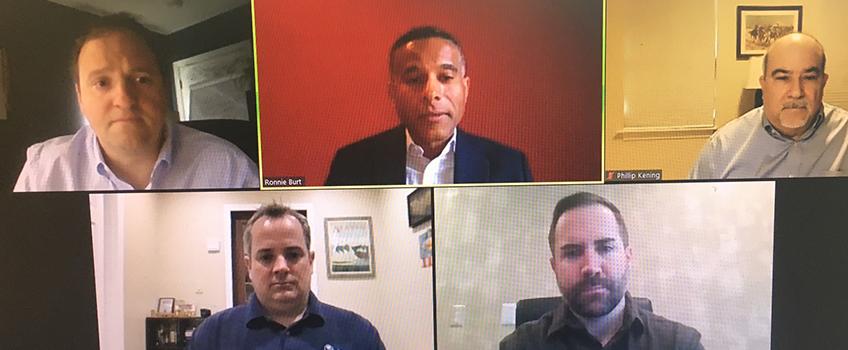Marketing Experts Say Be Prepared for Crowds

Galloway, N.J. - The demand for public events is strong, but it will still take coordinated marketing, COVID-19 safeguards and good service for businesses and events to have a successful rebound from the pandemic, a panel of experts told more than 40 participants at a webinar April 29.
The event, "Getting Back Together: Restoring Consumer Confidence in Public Gathering Spaces," was co-sponsored by the Lloyd D. Levenson Institute of Gaming Hospitality and Tourism at Stockton University (LIGHT) and the Greater Atlantic City Chamber of Commerce.
Chamber President Michael Chait moderated the event. Panelists were:
- Ronnie Burt, Vice President of Sales & Marketing of the Atlantic City Convention Center and Jim Whelan Boardwalk Hall.
- Bill Hansen, Vice President at Eiger Marketing Group & Tournament Director for the ShopRite LPGA Classic.
- Phil Kening, Instructor of Business Studies, Marketing at Stockton University and founder and Principal with Beacon Marketing Group, Inc. which specializes in marketing research, analytics and planning services. Kening also previously served as vice president of marketing for the Sands Hotel and Casino.
- Dave Sholler,Executive Vice President of Communications, Philadelphia 76ers and Harris Blitzer Sports & Entertainment.
All of the panelists agreed that there is a lot of pent-up public demand for activities and events. People want to get out. But businesses and event organizers will still have to develop a consistent message and promote what they are doing to keep people safe from the coronavirus and its variants.
Following are excerpts from the event. A recording of the webinar is on LIGHT’s website.
Michael Chait: “We all have an interest in getting back together. What will that look like now? What will it look like in the future?
Dave Sholler: We have seen the power of the home court advantage – how much the players feed off the energy of the crowd. Families are back in the arena and you can feel the emotion.
Ronnie Burt: These are the times when you build trust. We have been operating as a field hospital, a COVID testing site and a vaccine site. We have had to be empathetic and compassionate.
Phil Kening: This was not what we or college students expected of their college experience. We have really had to communicate to keep them engaged. We expect to be back in September, but we can’t guarantee the future.
Dave Sholler: So much of what we learned is adaptability, and sharing with the public what we are doing. But you have to show the employees first. They are your ambassadors. And we have to all work together as an industry.
Bill Hansen: We needed to lead by example. We have to show all of our volunteers what our guidelines are and what we are doing.
Michael Chait: Is there confusion about the safety protocols and the changes?
Phil Kening: It is complicated. There are different regulations for different events. People have different opinions. But LIGHT did a survey in January and February that showed people who came to Atlantic City felt safe here. (https://stockton.edu/light/documents/ac_visitor_study-final-report-4.23.21.pdf)
Michael Chait: It is all about moving forward. The virus is not going away. It’s how we respond. How important is marketing?
Ronnie Burt: We have to communicate to customers clearly. Marketing is critical to rebuilding the business, and it has to be a sustainable and consistent message. We have to have unity among all the assets in Atlantic City to invite the customer back.
Michael Chait: What about budgeting funds to get the message out?
Dave Sholler: The bulk is digital-centric, but also connecting with media, and telling stories to amplify the message. There are so many misconceptions about Atlantic City, but the power to me is how they rallied.
Ronnie Burt: We consume news differently now. There are hyperlocal websites. We can choose what we want to see. We need to know how deep we need to dig to connect.
Bill Hansen: Last year our message (for the LPGA tournament) was watch us on the Golf Channel because people could not come. This year we will be open and that will be our message. There is pent-up demand.
Dave Sholler: This is an awesome opportunity to reset. We need to get people back. We can get them to try something new. They have been sitting home.
Michael Chait: I have been getting so many more calls about the Atlantic City Airshow. It’s outdoors and there is pent-up demand. There is nothing like the Thunderbirds flying over the ocean.
Bill Hansen: People are realizing how much they miss these events that they might have taken for granted since they happened every year.
Michael: Talk about marketing, revenue, experience? What’s more important?
Phil Kening: Profits come from repeat business, but you have to deliver the goods.
Dave Sholler: We put a priority on service. A bad experience stays with you.
Bill Hansen: We can get people out, and if they have a good experience, they tell others and that brings more business. If they have a bad experience, you lose people. A new event will need more marketing and sales. A longtime event you have to focus on the continued best experience.
Michael Chait: What are your thoughts about vaccination cards?
Dave Sholler: We’ve talked about vaccination sections. We’re trying to find creative solutions. If vaccinations are up, how can we use that to put more fans in the stands?
Bill Hansen: For players, the advantage of vaccination was they could show the card to avoid having to get tested.
# # #
Contact:
Diane D’Amico
Director of News and Media Relations
Galloway, N.J. 08205
Diane.D’Amico@stockton.edu
609-652-4593
609-412-8069
stockton.edu/media
Stockton University


